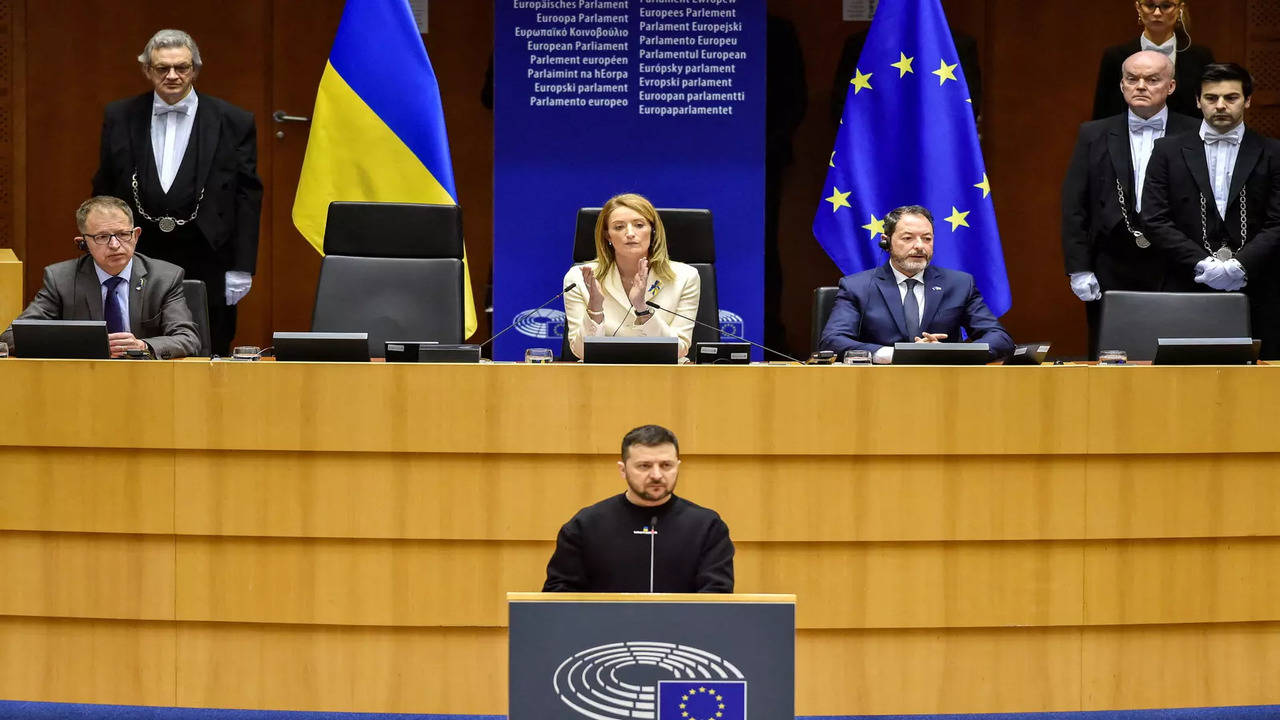BRUSSELS: European Union (EU) countries did not reach agreement on Wednesday about new sanctions against Russia, and planned more talks to have the package ready for the one-year anniversary of Moscow’s invasion of Ukraine on Friday, diplomats said.
The proposed package includes trade curbs worth more than 10 billion euros, according to the bloc’s chief executive, including a ban on EU imports of Russian rubber. It would also bar more EU exports to Russia of tech equipment and spare parts Moscow might use on the battlefield.
The Brussels-based executive also wants the 27 EU countries to better track Russian assets on their soil as the bloc seeks ways to use them to help rebuild Ukraine from the war. Some countries, however, pushed back against the spectre of facing fines for failing to report, according to the sources.
“There are several issues outstanding, including on rubber and reporting obligations,” said one of the sources, who all spoke under condition of anonymity due to the confidentiality of the negotiations between EU countries.
More talks among Brussels representatives of EU members were due on Thursday afternoon, said the sources.
“We remain confident that an agreement will be reached quickly tomorrow,” said another EU diplomat, adding it would then be formally finalised on Friday.
Taken all together, the sanctions against Russia would be the toughest the bloc has ever imposed.
The looming 10th package of penalties since Moscow invaded is designed to make financing the war more difficult, including by cutting more banks including the private Alfa-Bank and the online bank Tinkoff off from SWIFT.
They would also blacklist individuals linked to the Iranian Revolutionary Guards over production of drones used against Ukraine.
Ukraine has called on the EU to go further, but opposition from countries including Hungary, Bulgaria, France and Belgium means the bloc would not for now restrict cooperation with Russia’s nuclear industry or stop importing diamonds.
“We need to strengthen sanction policy, because the war is still lasting,” Ukraine’s Economy Minister Yulia Svyrydenko told journalists before attending the closed-door talks in Brussels on Wednesday.
“It’s very important for us. So that’s why we hope that we will see these sanctions in the tenth package, otherwise, maybe in the next packages.”
The proposed package includes trade curbs worth more than 10 billion euros, according to the bloc’s chief executive, including a ban on EU imports of Russian rubber. It would also bar more EU exports to Russia of tech equipment and spare parts Moscow might use on the battlefield.
The Brussels-based executive also wants the 27 EU countries to better track Russian assets on their soil as the bloc seeks ways to use them to help rebuild Ukraine from the war. Some countries, however, pushed back against the spectre of facing fines for failing to report, according to the sources.
“There are several issues outstanding, including on rubber and reporting obligations,” said one of the sources, who all spoke under condition of anonymity due to the confidentiality of the negotiations between EU countries.
More talks among Brussels representatives of EU members were due on Thursday afternoon, said the sources.
“We remain confident that an agreement will be reached quickly tomorrow,” said another EU diplomat, adding it would then be formally finalised on Friday.
Taken all together, the sanctions against Russia would be the toughest the bloc has ever imposed.
The looming 10th package of penalties since Moscow invaded is designed to make financing the war more difficult, including by cutting more banks including the private Alfa-Bank and the online bank Tinkoff off from SWIFT.
They would also blacklist individuals linked to the Iranian Revolutionary Guards over production of drones used against Ukraine.
Ukraine has called on the EU to go further, but opposition from countries including Hungary, Bulgaria, France and Belgium means the bloc would not for now restrict cooperation with Russia’s nuclear industry or stop importing diamonds.
“We need to strengthen sanction policy, because the war is still lasting,” Ukraine’s Economy Minister Yulia Svyrydenko told journalists before attending the closed-door talks in Brussels on Wednesday.
“It’s very important for us. So that’s why we hope that we will see these sanctions in the tenth package, otherwise, maybe in the next packages.”

